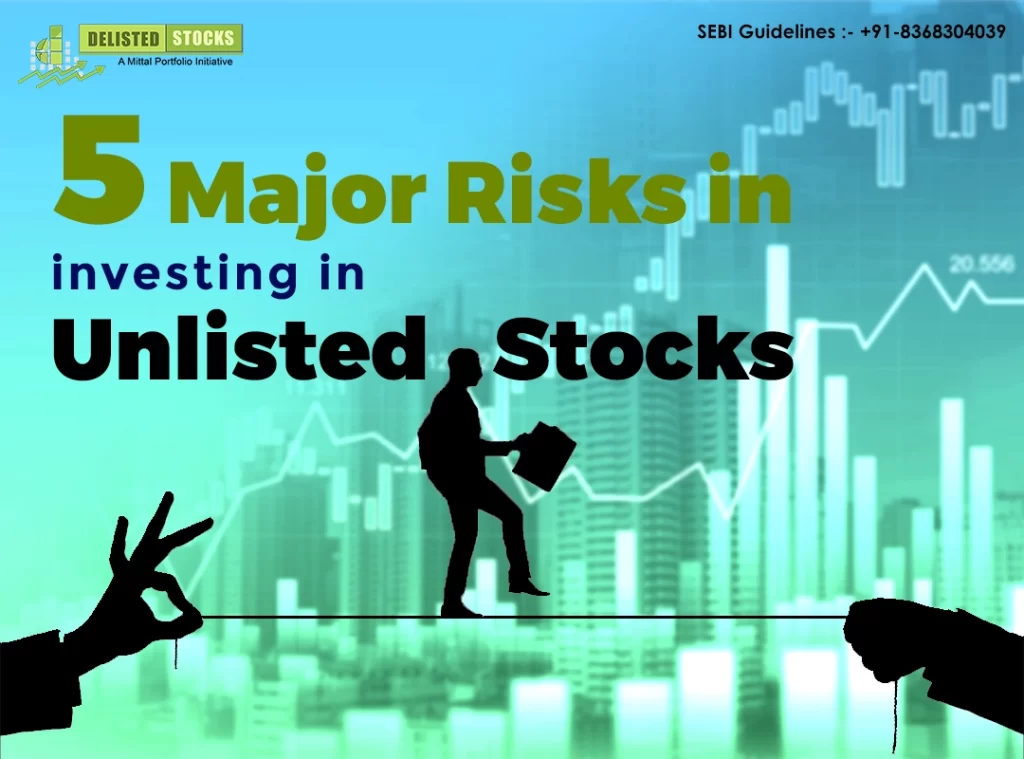
14th January, 2022
Investing in stock markets is risky business!!!
And, investing in unlisted stocks, with lesser regulations and an informal market for buying and selling them, may even get more riskier.
Unlisted shares, as the name suggests, are simply those that are not listed on stock exchanges like NSE or BSE. They can be high growth companies like Ola and Oyo or simply subsidiaries of other successful conglomerates like HDB Financial Services, which is a subsidiary of HDFC Bank.
What drives people to invest in unlisted shares is an opportunity to earn a low-risk, high-return (high possibility of multibagger) that is not easily available in the listed market.
The companies usually do not list on exchanges before they have already achieved a certain level of success and reached a mature level of a good user base or revenue stream. Thus, it is the pre-listing phase where massive value creation happens. And, Investors understand this and remain eager to grab a bite of that value.

But, in order to make sure that getting that bite does not leave a bitter taste in the mouth, you need to understand five risk factors that are usually associated with investing in unlisted shares.
 #1. Liquidity Risk
#1. Liquidity Risk
Liquidity risk is one of the biggest risks for any investment. This basically means you may not be able to sell your investment whenever you need the money without significant loss of capital.
For example, suppose you hold 100 shares of Lava International, a company that makes electronic devices, for a while now. You know that the company is going to come out with an initial public offer (IPO) soon, and in anticipation, the value of your investment has jumped 10x thanks to increased demand.
Now, if you need money for an emergency purpose. You realise it is the best time to redeem your investment. But suddenly, suppose the company says it will not bring an IPO for another six months as the market is not conducive.
When very few investors want to buy the shares you hold when the uncertainty has creeped in and you are forced to hold on to your investments.
This is just an example of liquidity risk. This risk is not unique to the unlisted market but can happen in low volume shares on stock exchanges as well.
#2. Less Transparency
Usually, if you invest in any listed company, by law that company is mandated to publicly report any information that may impact the share prices be it new business plans, any deals, plan of borrowing money or paying off the liabilities.
But unlisted companies are not obligated to tell you anything even if you hold a significant number of shares of the company. Most of their decisions are taken usually by the promoter of the company or large institutional investors.
This lack of regular information may put your investment at risk especially if something has happened with the company that has a negative bearing on share prices, for example, fire in one of its factories.
#3. Valuation Risk
The two risks stated above bring us down to the third risk: The difficulty in arriving at a fair value in absence of liquid markets and limited financial information about the company.
Usually, a financial analyst values a company based on their earnings statements, growth plans, how it manages its debt and management commentaries. The market ascribes a value tracking the demand and supply of shares. This is what is usually reflected in the share prices.
In case of unlisted shares, most of this information is either absent or not readily available on time. This means you may be paying far more for a share that it is worth, or selling it for it far less. (Read more about to avoid buying overvalued unlisted shares)
#4. Dilution Risk
In the growth phase, many businesses try to generate capital to expedite their expansion plans. One of the major routes of getting capital is issuing fresh shares of the company to a new investor. This is necessary but usually means the shares that you hold may be worth less than earlier.

Let’s understand this with a simple example.
Suppose there are a total 100 issued shares for a company valued at Rs 100 crore. That means every share is worth Rs 1 crore now.
Now, the company management approves issuing 20 shares to a new private equity investor at the same valuation. Now there are 120 shares and the value of the company is still at Rs 100 crore, meaning the value of one share falls to Rs 83.33 lakh.
This is a bare-bone example and practically, issuing shares is much more complex, but it gives you the idea of the dilution risk for the existing investors.
#5. Market Risk
Market risk is basically how sentiments in the listed market impact those in the unlisted market. When the listed markets are buoyant and investors are trading high, the unlisted market also sees increased demand for shares.
Conversely, pessimism in the stock market may also spread to the unlisted market very swiftly. In such a case, if you want to sell your investments, you may not get the best value for your shares.
How to avoid these risks?
Risks are associated with any investments and unlisted shares are not different. Most of the risks mentioned above can easily be mitigated by tracking fundamentals of the company, investing in unlisted stocks with high liquidity in the private market, trading with reputed dealers and paying heed to their advice. [Read here about 5 most liquid unlisted stocks]
In fact, the best way to avoid these risks is to understand them.
Read more:
LAVA IPO: Short-term listing gains or long-term buy?
Cryptocurrencies or Unlisted shares: where should you invest?
